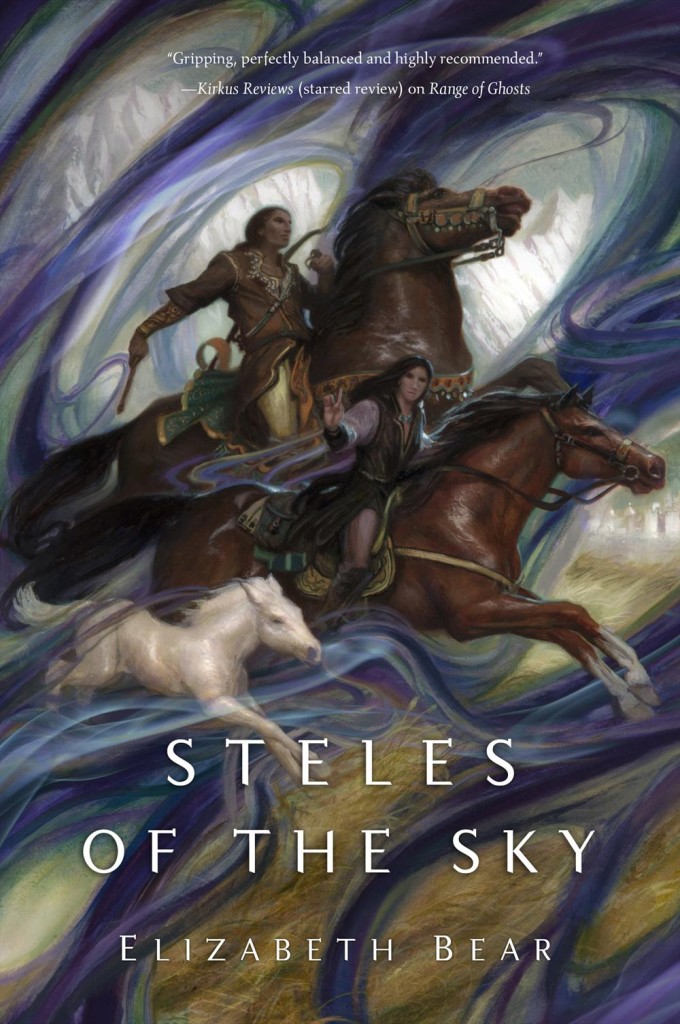 Elizabeth Bear is joining us today with her novel Steles of the Sky. Here’s the publisher’s description.
Elizabeth Bear is joining us today with her novel Steles of the Sky. Here’s the publisher’s description.
Elizabeth Bear concludes her award-winning epic fantasy Eternal Sky trilogy in Steles of the Sky.
Re Temur, legitimate heir to his grandfather’s Khaganate, has finally raised his banner and declared himself at war with his usurping uncle. With his companions—the Wizard Samarkar, the Cho-tse Hrahima, and the silent monk Brother Hsiung—he must make his way to Dragon Lake to gather in his army of followers. But Temur’s enemies are not idle; the leader of the Nameless Assassins, who has shattered the peace of the Steppe, has struck at Temur’s uncle already. To the south, in the Rasan empire, plague rages. To the east, the great city of Asmaracanda has burned, and the Uthman Caliph is deposed. All the world seems to be on fire, and who knows if even the beloved son of the Eternal Sky can save it?
What’s Elizabeth’s favorite bit?

ELIZABETH BEAR
My favorite bits of Steles of the Sky, it turns out, are all about books.
The funny thing is, I didn’t even realize it until I sat down to think about this essay. But this is a book that’s full of other books.
There is the slave-poetess Ümmühan, for whom books are a religion. Quite literally, as it happens. The scene where, as a reward for great service–for great treachery–she is permitted to hold and read an ancient, precious story is very dear to me. It reminds me of a time that an archivist friend let me hold a book older than Shakespeare, and the sense of awe and connection I felt.
There are the poison grimoires of Erem, ancient and treacherous and full of monstrous knowledge, necromancy, and horror. These are books that blind the eye that reads them, rot the finger that turns their pages, deafen the ear that hears their language spoken aloud. These are books that grant unimaginable power to those that dare their terrors. This conceit–this metaphor–speaks to me as one of the thematic hearts of the novel.
There are the books that a Dowager Empress loves, full of stories of heroes and tricksters that inspire her–and inspire her to ask awkward questions, as well.
There is Brother Hsiung’s fan-book, made of slats bound with cord, upon which he scribes his confession and his plea.
There are bound books and board books and scrolls. Each contradictory. Each full of something somebody cared enough about to write down.
There are the books the Wizard Samarkar misses–the books of a life left behind. And there are the other books she seeks again, though she much brave the dark passages of the earth and their antediluvian and inhuman librarian to find them.
There are books of stone and books of paper. Books of reed and books of glass. There’s a whole lot of books in this world.
And I love each one. Including the one that contains them all–along with wizardry, sorcery, engineering, loyalty, treachery, science, love, hate, enlightenment, sacrifice, selfishness, vengeance, compassion, and a healthy dose of megafauna.
I think it must be bigger on the inside.
Well, books are a kind of magic, after all. You might even say, a spell.
LINKS:
http://www.elizabethbear.com/?
Excerpt: http://www.tor.com/
Goodreads: https://www.
BIO:
Elizabeth Bear was born on the same day as Frodo and Bilbo Baggins, but in a different year.When coupled with a childhood tendency to read the dictionary for fun, this led her inevitably to penury, intransigence, and the writing of speculative fiction. She is the Hugo, Sturgeon, Locus, and Campbell Award winning author of 25 novels and over a hundred short stories. Her dog lives in Massachusetts; her partner, writer Scott Lynch, lives in Wisconsin. She spends a lot of time on planes.

Well, books are a kind of magic, after all. You might even say, a spell.
Damn straight. Given the traditions of literacy in the cultures that you based some of the cultures along the Celadon Highway on, having characters interested in the power and magic of books is a feature.